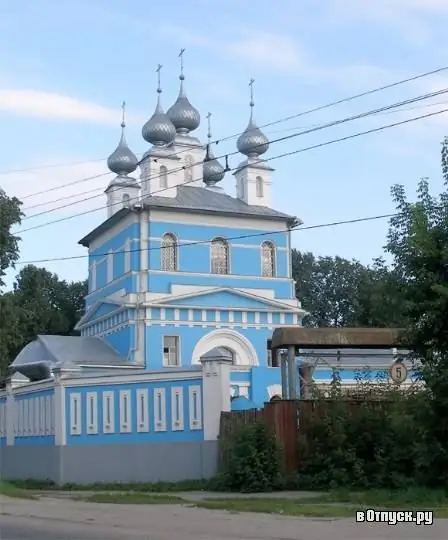
Description of the attraction
The Holy Dormition Monastery in the city of Ivanovo was founded with the blessing of Patriarch Alexy II on May 25, 1998.
Since the end of the 18th century, the Assumption Cemetery was located in the southeastern part of Ivanovo. In 1815, a wooden church was moved here from the Intercession Monastery. In 1819-21, in the tradition of classicism, a bell tower was built at the temple according to the project of the Vladimir architect E. Ya. Petrov In 1834-43, according to his own project, the manufacturers K. I. Butrimov and N. S. Shodchin erected a new Church of the Assumption with side-altars in the name of the VIC. Barbarians and the Nativity of John the Baptist.
In 1924, the church community was accused by the authorities of keeping property that had been surrendered by the church head N. T. Shchapov in order to "hide from requisition." The agreement with the Orthodox community was terminated, and the Assumption Church was handed over to the Renovationists. In 1933, the cemetery was destroyed, and on this place they set up an amusement park of the Melange Combine, popularly called "the park of the living and the dead." The church was mutilated and plundered. It was rebuilt for the needs of the Ivanovskie Electric Networks enterprise.
In 1995, when the temple was returned to the Orthodox Church, a community of those who chose the monastic path began to gather here. Much has been done since that time. Since the founding of the monastery, the monks have especially venerated the family of holy martyrs and passion-bearers of the royal family - Nicholas II, Empress Alexandra, Princess Tatiana, Olga, Maria, Anastasia, Tsarevich Alexei. In the monastery park, a church in the name of these martyrs has already been practically completed, which is the main shrine of the monastery. The temple, which was built by Russian architects, is majestic in its architectural design. The long fervent prayers of the monks, the delicate work of the workers, and the personal prayers of Archbishop Ambrose, manager of the Ivanovo-Voznesensk and Kineshma diocese were not in vain.
All the people took part in the construction of the temple. These are the parishioners of the monastery, who constantly contributed their bit, local benefactors, relatives of royal martyrs, monarchs from European countries, Russian benefactors, including Nikita Mikhalkov, Mikhail Chepel, Andrey Bykov.
In the future, it is planned to build another shrine - a museum in memory of the royal martyrs. This idea belongs to Archpriest Vasily Fonchenkov, the sovereign himself appeared in a vision to him in 1978. After that, Father Vasily began to collect various relics related to the Emperor. Now the creation of a similar museum is being prepared with the church's keeper, Andrei Bykov.
The Holy Dormition Monastery has several farmsteads. Kazan courtyard is located in the village of Kotsyno, Ivanovsky district. There is a wooden building with a Kazan church house, which is under renovation, and a ruined stone Resurrection church with side-chapels in honor of St. Nicholas and the Kazan Icon of the Mother of God.
Znamensky skete is located in the village of Bunkovo, Ivanovsky district. The wooden Church of the Sign is located here, which is at the final stage of construction, and is being finished. The Church of the Resurrection of the Word is located in the village of Toptygino, Privolzhsky region. In the courtyard there is a church in honor of the Resurrection of the Word, consecrated in 2001 with chapels in the name of Nicholas the Wonderworker and the Smolensk Icon of the Mother of God. Lezhnevskoe courtyard is located in the village of Lezhnevo. This includes the temples of the Intercession of the Virgin, the Kazan Church, the Nativity of Christ and the Nikolsky Church. The monastery's farmsteads also include two hospital churches in Ivanovo: in honor of Nicholas the Wonderworker in the Regional Clinical Hospital and in honor of the Icon of the Mother of God "Assistant in Childbirth" at the Research Institute of Motherhood and Childhood.
The monastery receives pilgrims. Anyone can come to the monastery and stay here for three days. If the pilgrim stays for a longer period, then he goes to the disposal of the assistant housekeeper for general obedience. Upon admission to accommodation, the pilgrim is provided with a fraternal meal (two meals a day) and participation in daily services.






